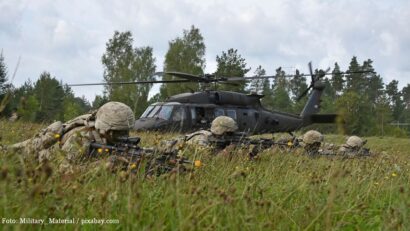Governing and Human Rights
A look at the latest Human Rights Watch annual report.

Corina Cristea, 20.02.2015, 13:20
Human Rights Watch has published its annual report, which states that “human rights violations played an important role in fomenting and aggravating” some of the current crises. The organization warns that when taking measures for fighting terrorism and increasing security, governments should not ignore human rights. The report was presented in Beirut by the executive director of the organization, Kenneth Roth; it is 656 pages long, looking at human rights in over 90 countries.
The report shows that the rise of the self-proclaimed Islamic State is among the global challenges that resulted right away in human rights abuses. According to the report, “ISIS did not emerge in a vacuum. In part it is a product of the United States-led war and military occupation of Iraq that began in 2003, which produced, among other things, a security vacuum. More recently, the sectarian policies of the Iraqi and Syrian governments, and international indifference to those governments’ serious rights abuses, have been important factors”. Over 200,000 people have been killed in the four years of conflict in Syria, and, according to the document, the United States and its allies have allowed their military operations against ISIS to overshadow efforts aimed at forcing the Assad regime to end abuses.
According to the document, many countries, among them Nigeria, Kenya, Egypt and China, have responded to real or presumed terrorist threats with abusive policies that have resulted in crises. Also, the report warns that there is a danger in France for the government’s reaction to the Charlie Hebdo attacks, namely using anti-terrorist legislation to indict free speech that does not incite to violence, to squash freedom of expression and encourage other governments to use such legislation against its opponents.
In its over 600 pages, HRW details human rights violations in all regions of the world where conflicts are underway, and analyses the causes of major crises affecting millions. The head of the organization says that what was once the Arab Spring has degenerated into conflict and repression, Islamists are committing mass murder in the Middle East, parts of Asia and Africa, while in Ukraine the seeds of a new Cold War have started to emerge, and a civilian airliner has been shot our of the sky.
Sometimes it seems that the world is on the verge of unravelling, says Kenneth Roth. Based on developments in 2014, he believes that “Many governments have responded to the turmoil by downplaying or abandoning human rights. Some of these governments continue to raise human rights concerns, but many appear to have concluded that today’s serious security threats must take precedence over human rights. In this difficult moment, they seem to argue, human rights must be put on the back burner, a luxury for less trying times. That subordination of human rights is not only wrong, but also shortsighted and counterproductive.”
As for the eastern Ukraine situation, the report says that civilians bore the brunt of it, and notes the abuses committed by both sides in the conflict. It also points out that the attention grabbed by these events overshadowed the abuses committed by Russia in Crimea, which it took over in 2014, and where the local Tartars, anti-annexation militants and the free press became targets for Russian paramilitary groups.
For Romania, as NATO eastern flank country, the consolidation of this flank is an absolute priority at this time, according to the Romanian authorities. Recently, at the GLOBSEC debate on strategic topics in Bratislava, Romanian foreign minister Bogdan Aurescu spoke about the crisis without precedent since WWII, which started last year, in defiance of fundamental international law, and pleaded for a common front in the face of the Ukrainian crisis. In spite of the cease-fire agreements, the conflict continues to produce victims, and future developments are murky. In an interview with Radio Romania, professor Iulian Fota, a former presidential security adviser, talked about the possible impact on Romania of an open conflict so close to its borders:
Iulian Fota: “Our security situation is questioned by the events in Ukraine, as it was by the 2008 Georgia conflict. This Ukrainian crisis and the conflict in the east, as well as the illegal annexation of Crimea, only enhance these uncertainties and worries. The question for us is what to do in this situation. We have no control over the international situation, we are too small a country, but we do have control over our own situation. Hence my message: Romania’s best reaction in a crisis like this is to put our country in order.” Iulian Fota explains that, quote “we don’t know what the future will bring, and I hope we won’t be in the situation we’ve been at other times in our history, such as in 1940, when we were basically given a pop quiz, we had to hand over national territories within 48 hours, and were incapable of reacting.”






























